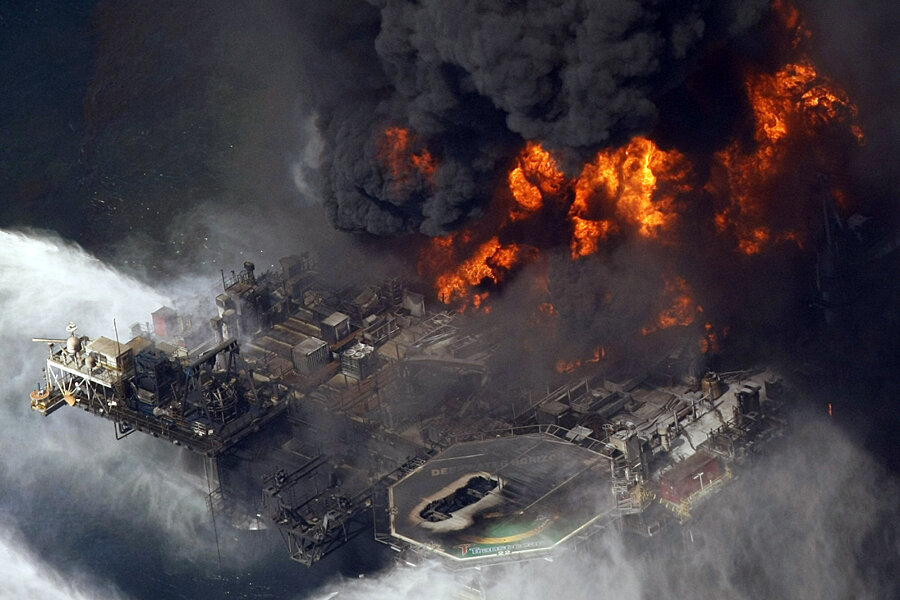BP made 'profit-driven decisions' in 2010 oil spill, judge says
Loading...
| NEW ORLEANS
BP bears the majority of responsibility among the companies involved in the nation's worst offshore oil spill, a federal judge ruled Thursday, citing the energy giant's reckless conduct in a ruling that exposes the company to billions of dollars in penalties.
BP PLC already has agreed to pay billions of dollars in criminal fines and compensation to people and businesses affected by the disaster. But U.S. District Judge Carl Barbier's ruling could nearly quadruple what the London-based company has to pay in civil fines for polluting the Gulf of Mexico during the 2010 spill.
Barbier presided over a trial in 2013 to apportion blame for the spill that spewed oil for 87 days in 2010. Eleven men died after the well blew.
As the Monitor reported in April this year, the region is still working to recover from the spill:
Four years after the Gulf of Mexico oil spill released more than 200 million gallons of crude into the water, a leading environmental organization says the migratory and reproductive cycles of area wildlife have been severely altered and at least one species of sea turtles is close to extinction.
The judge essentially divided blame among the three companies involved in the spill, ruling that BP bears 67 percent of the blame; Swiss-based drilling rig owner Transocean Ltd. takes 30 percent; and Houston-based cement contractor Halliburton EnergyService takes 3 percent.
In his 153-page ruling, Barbier said BP made "profit-driven decisions" during the drilling of the well that led to the deadly blowout.
"These instances of negligence, taken together, evince an extreme deviation from the standard of care and a conscious disregard of known risks," he wrote.
BP said in a news release that it would appeal the ruling, saying the company "believes that an impartial view of the record does not support the erroneous conclusion reached by the District Court."
In a statement, BP said it strongly disagreed with the ruling:
BP believes that the finding that it was grossly negligent with respect to the accident and that its activities at the Macondo well amounted to willful misconduct is not supported by the evidence at trial. The law is clear that proving gross negligence is a very high bar that was not met in this case.
The ruling means BP could face as much as $17.6 billion in civil fines under the Clean Water Act, said David Uhlmann, a University of Michigan law professor and former chief of the Justice Department's environmental crimes section.
"It also repudiates BP's claims that it was merely negligent and will further damage BP's already badly damaged reputation," Uhlmann wrote in an email.
The judge was assigned to oversee most of the federal litigation spawned by BP's spill. Last year, he presided over two phases of a trial for claims against BP and its contractors brought by the federal government, the five Gulf states and private lawyers representing businesses and residents.
Barbier heard eight weeks of testimony without a jury for the trial's first phase, which was designed to identity the causes of the blowout of BP's Macondo well and assign percentages of fault to the companies involved in the drilling project.
The judge heard three weeks of testimony for the second phase, which focused on dueling estimates of how much oil spilled into the Gulf and examined BP's efforts to seal the well.
Millions of gallons of crude gushed into the Gulf after the well blew and triggered an explosion on the Deepwater Horizon drilling rig, killing wildlife, staining beaches and polluting marshes. BP ultimately sealed its well after several techniques failed to stop the gusher.
BP says it has spent more than $24 billion in spill-related expenses, including cleanup costs and payments to businesses and residents who claim the spill cost them money. The company also has estimated that it will pay a total of $42 billion to fully resolve its spill-related liability.
BP pleaded guilty in January 2013 to manslaughter charges for the rig workers' deaths. BP also agreed to pay a record $4 billion in penalties as part of its deal with the Justice Department, but the plea agreement didn't resolve the federal government's civil claims against BP.
Under the Clean Water Act, a polluter can be forced to pay a maximum of either $1,100 or $4,300 per barrel of spilled oil. The higher limit applies if the company is found grossly negligent — as BP was in Barbier's ruling. But penalties can be assessed at amounts lower than those caps.
Government experts estimated that 4.2 million barrels, or 176 million gallons, spilled into the Gulf. BP urged Barbier to use an estimate of 2.45 million barrels, or nearly 103 million gallons, in calculating any Clean Water Act penalties. Both sides agreed that 810,000 barrels, or 34 million gallons, of oil escaped the well but were captured before it could pollute the Gulf.







